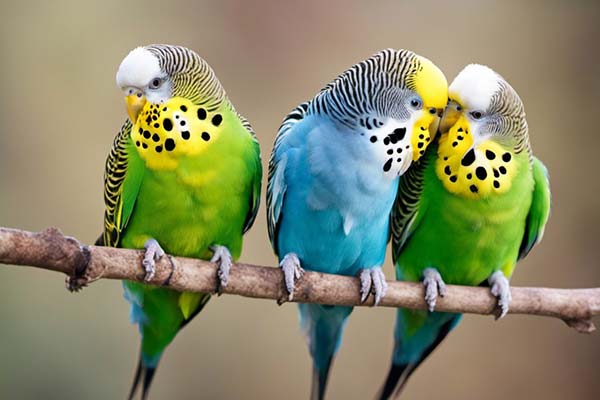Parakeets are famous as pet birds due to their small size, colorful plumage, and cheerful chirping.
One of the most common questions people ask about parakeets is whether they can talk. Yes, parakeets can talk, but it requires dedicated time, patience, and consistent training to teach them human speech mimicry.
Parakeets can learn many words and phrases, but not all will talk. Male parakeets are generally better talkers than females; some never learn to talk. To teach a parakeet to talk, it is crucial to start training them young, ideally when they are less than one year old.
Parakeet Communication
Parakeets are social birds that communicate with each other through chirping, singing, and repetition of sounds.
They do not have vocal cords like humans, but they have an organ called the syrinx at the base of their windpipe, allowing them to produce various sounds.
While parakeets can’t speak like humans but can learn and mimic words and phrases, they can recognize simple words and phrases and repeat them back with practice.
Some parakeets have a larger vocabulary than others and can even whistle tunes or imitate other birds’ sounds.
Parakeets also communicate with each other through body language and vocalizations. They use different sounds and postures to convey different meanings.
For example, a parakeet may fluff its feathers and raise its wings to show aggression or excitement. They may also use different chirping patterns to indicate hunger, thirst, or a desire for attention.
Male parakeets tend to be more vocal than females and are likelier to learn how to talk. However, each parakeet has its unique personality and talking abilities. Some parakeets may never learn to talk, while others may surprise their owners with their extensive vocabulary.
Training Parakeets to Talk
Parakeets can learn to talk, but training them takes effort and patience. Here are some tips to help teach your parakeet to talk:
Focus on Specific Words
Choose specific words or phrases you want your parakeet to learn, and repeat them consistently. It is essential to be patient and to repeat the words often, as it can take time for your parakeet to learn them.
Use Positive Reinforcement
Reward your parakeet with treats and praise when they say the words correctly. Positive reinforcement is vital in training your parakeet to talk.
Minimize Distractions
Set up a calm and undisturbed space for your parakeet’s learning. This aids their concentration on the words you’re imparting.
Provide Toys and Interaction
Parakeets are social birds and enjoy interacting with their owners. Provide toys and interaction to keep your parakeet engaged and interested in learning.
Be Consistent
Consistency is critical in training your parakeet to talk. Spend repeating the words you want them to learn daily and providing positive reinforcement.
Teaching your parakeet to talk demands dedication and patience. Through steady training and positive reinforcement, your parakeet can acquire the ability to utter certain words or phrases.
Remember to focus on specific words, use positive reinforcement, minimize distractions, provide toys and interaction, and be consistent in your training efforts.
Factors Influencing Parakeet’s Ability to Talk
Parakeets are known for mimicking human speech, but not all can talk. Several factors can influence a parakeet’s ability to talk.
Genetics
Certain parakeets have a genetic inclination for speech, yet this is not universal. To acquire a chatty parakeet, opt for a lineage with a reputation for talkativeness. Remember that genetics alone doesn’t solely govern a parakeet’s talking prowess.
Age
Age is another critical factor influencing a parakeet’s ability to talk. Younger parakeets are more likely to learn how to talk than older parakeets.
This is because younger parakeets are more receptive to learning new things. If you want your parakeet to talk, it is best to start teaching them when they are young.
Gender
Male parakeets are more likely to talk than female parakeets. This is because male parakeets are more vocal than female parakeets. However, this does not mean that female parakeets cannot talk. With proper training, female parakeets can also learn how to talk.
Environment
The environment in which a parakeet lives can also influence their ability to talk. Parakeets kept in a comfortable and stress-free environment are likelier to talk than parakeets kept in a stressful environment. If you want your parakeet to talk, ensure they are comfortable and happy in their environment.
Training
Training is the most critical factor influencing a parakeet’s ability to talk. If you want your parakeet to talk, you must train them. This involves talking to your parakeet regularly, using simple words and phrases, and rewarding them when they mimic your speech. With proper training, most parakeets can learn how to talk.
Parakeet’s Interaction with Humans
Parakeets can make excellent pets and can form strong bonds with their owners. However, it is crucial to establish trust with your parakeet before attempting any interaction. Offering millet sprays can be a great way to gain your parakeet’s confidence and show them you are a friend.
It is important to note that parakeets are social animals and need interaction with their owners. Lack of interaction can lead to screaming and other negative behaviors. Bonding with your parakeet through regular interaction can prevent these behaviors from developing.
Parakeets communicate through body language, and owners must understand their bird’s behavior. A healthy parakeet will have bright eyes, clean feathers, and be active and vocal. Owners should also be aware of their parakeet’s body language, which can indicate their mood and comfort level.
Parakeets are intelligent birds and can learn hundreds of words and phrases. Owners can teach their parakeets to talk through verbal praise and repetition. It is important to note that parakeets cannot form consonant sounds, so their speech may need to be clearer than other talking birds.
Owners should also know their parakeet’s behavior, as biting can signify discomfort or fear. Providing a mirror can be a great way to keep your parakeet entertained. Still, it is vital to monitor their behavior to ensure they do not become too attached to their reflection.

Diet and Talking Ability
The speech abilities of parakeets are notably influenced by their diet. A well-rounded diet featuring an assortment of fresh fruits and vegetables is crucial for their overall health and cognitive enhancement. Notably, carrots and celery stand out as advantageous vegetables for parakeets.
Carrots are rich in vitamin A, crucial for supporting eye health and bolstering the immune system.
Additionally, the beta-carotene in carrots can improve a parakeet’s ability to learn and remember words. Including carrots in a parakeet’s diet can also help prevent respiratory infections, hindering their talking ability.
Celery is a vegetable that supports a parakeet’s cognitive functions. Rich in antioxidants, it safeguards the brain from harm and enhances memory.
Celery is also a good source of vitamins and minerals, including vitamin K, folate, and potassium, which are all important for maintaining overall health.
In addition to fresh fruits and vegetables, parakeets should be provided with a high-quality pellet or seed mix specifically formulated for their dietary needs.
It is crucial to avoid giving parakeets foods high in fat, sugar, or salt, as these can lead to health problems and hinder their ability to learn and remember words.
Parakeet Sounds and Their Meanings
Parakeets are expressive birds that use a range of sounds like chirps, tweets, whistles, and squawks for communication.
Interpreting these sounds aids in connecting with your pet bird and identifying its emotions, such as happiness, contentment, or distress.
Here are some common parakeet sounds and their meanings:
| Sound | Meaning |
|---|---|
| Chirping | Contentment, happiness, or excitement |
| Squawking | Alarm, fear, or aggression |
| Whistling | Happiness or excitement |
| Regurgitating | A sign of affection or bonding between mates or between a parent and chick |
| Mimics | Parakeets can mimic sounds they hear, including speech or other sounds in their environment. |
It’s important to note that each parakeet may have their unique vocalizations and meanings behind them. You can learn to recognize their sounds and what they mean by spending time with your bird and observing their behavior.
